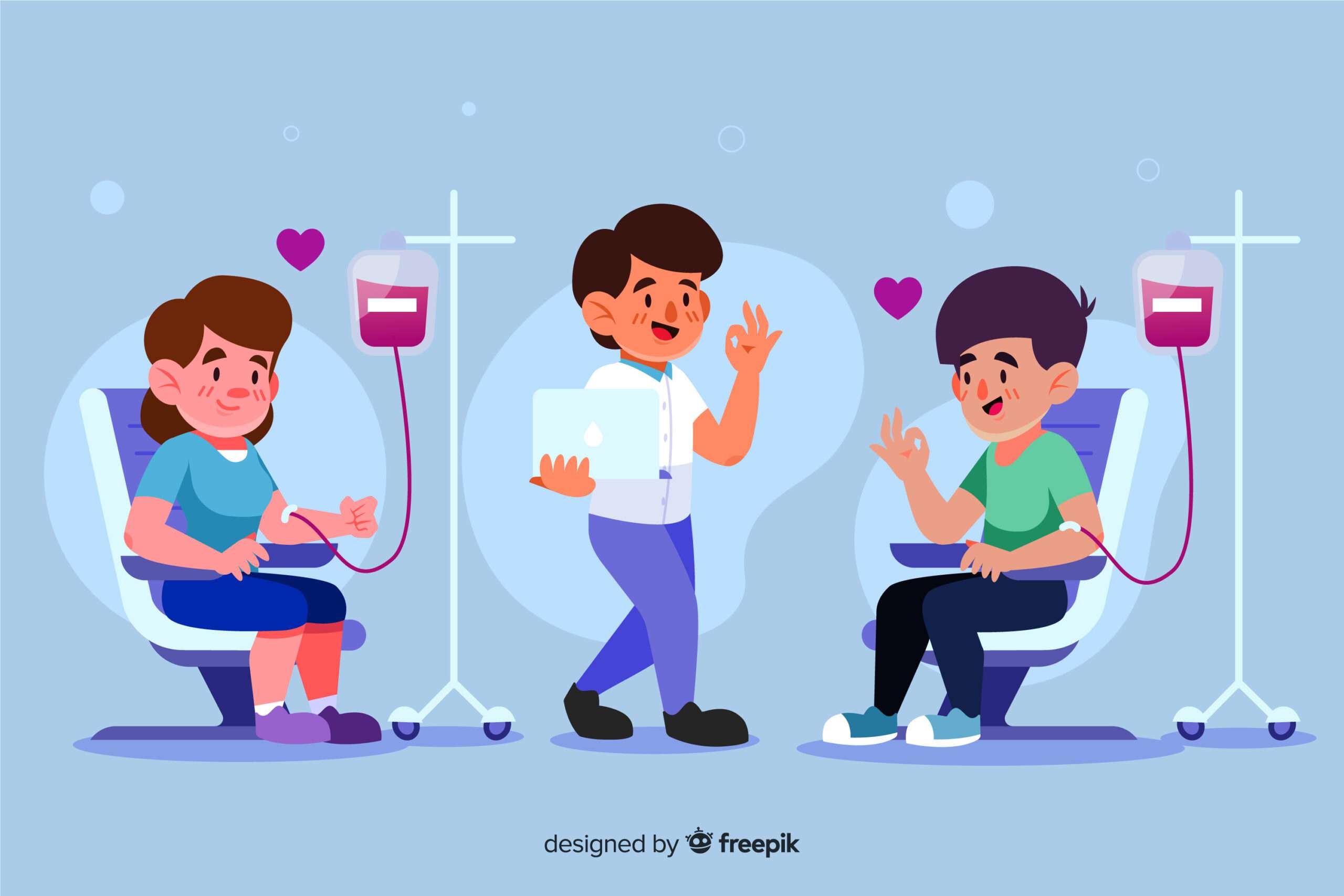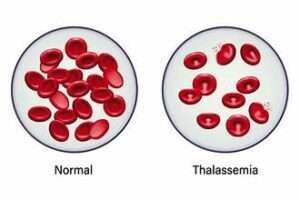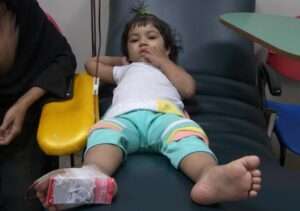Thalassemia in Children: Types, Symptoms & Diagnosis
- Dr Owais Rafiq
- August 12, 2024
- 8:38 am

Understanding Thalassemia in children

You might have heard the name Thalassemia and have always feared it because the disease seems to have bad effects on kids. Your fear is right as 4 out of every 10000 people in our world has it and kids are part of these statistics. But let’s not fear the disease and know about it a little through the article as we have based this article on knowledge about Thalassemia, its causes, symptoms, types, and even diagnosis.
How Can your kid get thalassemia?
Your kid cannot simply get Thalassemia from anyone as the disease is an inherited one and can be transferred from parents to kids. It means if you have Thalassemia your kids can also get it. If your kids, unfortunately, get it that means you had a problem with your genes that were responsible for making Hemoglobin and then you transferred that gene onto your kid.
Types of Thalassemia
Children receive instructions to make alpha globin and beta globin from their parents. The alpha globin and beta globin both join together and make the hemoglobin. Children receive one gene from each parent to make beta globin.
- If only one parent has thalassemia this condition is called minor thalassemia. It is also called thalassemia trait.
- If both parents suffer from Thalassemia, it is a more serious condition called major thalassemia.
Thalassemia minor
Thalassemia minor starts from birth as it is a genetic disease. It doesn’t change during the lifetime of children. Thalassemia minor shows no symptoms and therefore cannot be picked by any standard means or checkups unless a special test for thalassemia is done. The reason is that these children with thalassemia are not sick or experiencing any effects of the condition whatsoever.
Thalassemia major
The symptoms appear during early childhood. This is a serious class of Thalassemia. If the hemoglobin production is greatly reduced in the body, then it is diagnosed to be thalassemia major. These children diagnosed with thalassemia major encounter challenges in synthesizing the required amounts of hemoglobin in the body. So, the children will require blood transfusions regularly.
Which children are prone to Thalassemia?

- The risk of thalassemia is high in people who have thalassemia in the family medical history.
- The risk increases sufficiently if both parents have thalassemia.
- The Beta thalassemia is more prevalent in the Asia, Middle East and Mediterranean region out of all the localities.
- On the contrary, Alpha thalassemia is predominantly observed in the people inhabiting Southeast Asia, India, Southern China, Africa, and – as mentioned before – the Middle Eastern population.
How to diagnose Thalassemia in children?
Parents can detect the presence of thalassemia in their children by the following methods:
- The first sign that indicates that a person may have Thalassemia should actually be a thorough check of the family’s medical history. if you get to know that in your family history somebody has thalassemia then you can also fear that issue to come in your kids.
- If the couple has a history of thalassemia both parents can consult their physician where the fetus can be tested during pregnancy through CVS or amniocentesis.
- In CVS a sample taken from the placenta is screened for thalassemia. It is usually done after 11 months of pregnancy are passed.
- Another procedure is amniocentesis. For this procedure, a doctor takes a sample of fluid around the fetus and then later it is tested for thalassemia separately.
- Parents should take their children for checkups if they are anemic that is have low blood levels, have swollen bellies, or exhibit poor growth. If your child is showing any of these symptoms blood tests should be done in order to confirm thalassemia in children. The symptoms of thalassemia will be manifested in children with moderate or severe conditions within two years of birth.
Various tests for Thalassemia in children
Doctors might recommend the following types of tests: Doctors might recommend the following types of tests:
CBC
CBC stands for Complete Blood Count. Children who have got Thalassemia will have less red blood cells than normal because of a deficiency of hemoglobin. To show if your child has anemia (deficiency of blood) CBC can.
Newborn screening (hemoglobin electrophoresis)
The test for Hemoglobin electrophoreses is used to diagnose Thalassemia among children at some of the early life development stages. It can do this because this test is a process that doctors use to diagnose or monitor the presence of hemoglobin in blood, and since the thalassemia patients possess hybrids of wrong hemoglobin types, it will notice this.
beta-globin genotyping
This test is used by healthcare providers to search for gene changes in children
| Tests | Time of the test | What to see |
| CBC | Later in life | If the child has anemia |
| Newborn screening | Early detection | Variants of hemoglobin |
| Beta globin genotyping | Early detection | Gene changes |
Symptoms of Thalassemia in Children
Each child can suffer distinct symptoms of thalassemia. However, simple major thalassemia symptoms are listed below:
- Pale skin, especially noticeable in the palms, fingernails, and eyelid linings.
- Fatigue and overall lack of energy.
- Shortness of breath.
- Rapid heartbeat and palpitations.
- Poor growth and delayed development
- Difficulty with feeding
- Diarrhea
- Irritability and fussiness
- Fever
- Enlarged abdomen due to an enlarged spleen
- Formation of gallstones
- Enlarged liver
- Changes in bone structure
- Leg ulcers or sores
- Weak bones
Complications related to Thalassemia in Children
Children having thalassemia can suffer various kinds of complications. Some of these problems are mentioned here.
-
Iron overload
This is from the disease or through a number of blood transfusions, hence increasing the absorption of iron in the body. You are immune to infections that affect the heart, liver and endocrine gland if there is iron overload in your body. Also, in the endocrine system, many necessary hormones are produced for us within the body and in the case of an injury to this system, those hormones are produced in an abnormal pattern, and it becomes dangerous for a human being.
-
Risk of Infection
Thalassemia patients have a high risk of developing infection in their bodies. The risk increases further if your spleen is removed.
-
Bone Deformities
Thalassemia patients can experience abnormalities in their bone structure specifically in the face and skull. The disease expands the bone marrow, resulting in the widening of bones. It leads to thin and brittle bones and the risk of bone breaking becomes very high.
-
Enlarged spleen
Spleen is like a soldier who will be guarding your body 24/7 fighting against deadly infections and will be responsible for removing old and bad blood cells. But when the kid has got thalassemia his red blood cells will be destroyed, and his spleen will get enlarged. This enlargement of our body’s soldiers can cause the transfused red blood cells to have less life.
-
Slow growth
Thalassemia slows down the growth of children due to anemia.
-
Heart problems.
- Congestive heart failure and abnormal heart rhythms are also observed with severe thalassemia.
How Can Parents Help Kids with Beta Thalassemia?
You can take some measures to help your child live a better life with thalassemia:
- The first step is to understand your kid’s thalassemia type, symptoms, and treatment.
- Call your healthcare provider if you observe any change or have any queries.
- Call the provider in case your child has fussiness, fever, slowed growth, or feeding problems.
- If the doctor has recommended transfusions for the treatment make sure they are done regularly on schedule.
- It is better to assemble a healthcare team for your child.
Dr Owais Rafiq
Subscribe to Dr Owais YouTube channel
For parenting advice, child health, symptoms, causes and treatment of illness in children.





